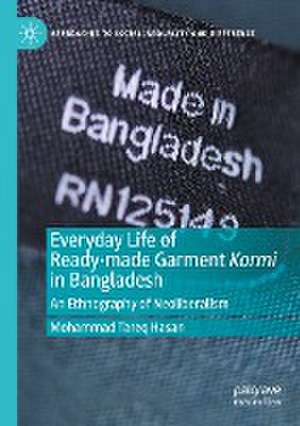Everyday Life of Ready-made Garment Kormi in Bangladesh: An Ethnography of Neoliberalism: Approaches to Social Inequality and Difference
Autor Mohammad Tareq Hasanen Limba Engleză Paperback – 17 iul 2023
| Toate formatele și edițiile | Preț | Express |
|---|---|---|
| Paperback (1) | 889.92 lei 6-8 săpt. | |
| Springer International Publishing – 17 iul 2023 | 889.92 lei 6-8 săpt. | |
| Hardback (1) | 895.09 lei 6-8 săpt. | |
| Springer International Publishing – 16 iul 2022 | 895.09 lei 6-8 săpt. |
Preț: 889.92 lei
Preț vechi: 1085.26 lei
-18% Nou
Puncte Express: 1335
Preț estimativ în valută:
170.31€ • 177.15$ • 140.60£
170.31€ • 177.15$ • 140.60£
Carte tipărită la comandă
Livrare economică 15-29 aprilie
Preluare comenzi: 021 569.72.76
Specificații
ISBN-13: 9783030999049
ISBN-10: 3030999041
Pagini: 322
Ilustrații: XXI, 322 p.
Dimensiuni: 148 x 210 mm
Greutate: 0.41 kg
Ediția:1st ed. 2022
Editura: Springer International Publishing
Colecția Palgrave Macmillan
Seria Approaches to Social Inequality and Difference
Locul publicării:Cham, Switzerland
ISBN-10: 3030999041
Pagini: 322
Ilustrații: XXI, 322 p.
Dimensiuni: 148 x 210 mm
Greutate: 0.41 kg
Ediția:1st ed. 2022
Editura: Springer International Publishing
Colecția Palgrave Macmillan
Seria Approaches to Social Inequality and Difference
Locul publicării:Cham, Switzerland
Cuprins
Part I.- 1. Contextualizing Ready-Made Garment Work in Bangladesh.- Part II.- 2. The Roots of Local Capitalism: Outlining and Understanding Global Connections.- 3. Tensions and Negotiations in Neoliberalism: Emergence of Garment Kormi as the Model Citizens.- Part III.- 4. Becoming Garment Kormi: Life in the Garment Factory.- 5. Kinship in the Factory: Garment Kormi Living a Life Away from Home.- 6. Negotiating the Public and the Private: Garment Kormi Becoming Joggo.- 7. Dare to Dream: Remaking Everyday Realities.- Part IV.- 8. Paradoxes of Factory Compliance: Auditing, CSR, and ‘New’ Dispossession.- Part V.- 9. The Multiple Realities of Neoliberalism and Garment Kormi.- 10.Epilogue: During the Pandemic.- Index.
Notă biografică
Mohammad Tareq Hasan is Assistant Professor in the Department of Anthropology, University of Dhaka, Bangladesh. He holds a PhD in Social Anthropology from the University of Bergen, Norway. His research interests include minority and ethnic groups, gender relations, collective action, anthropology of work, state formation, political economy, and egalitarianism.
Textul de pe ultima copertă
“Mohammad Tareq Hasan’s powerful and sensitive understanding of the situations of female garment workers in Bangladesh’s clothing factories critically contextualizes commanding theoretical discourse grounding their insights but simultaneously demonstrating the limits to their understanding. Hasan in his masterly analysis shows how ethnography is not merely illustrative of theory but central to its construction.”
—Bruce Kapferer, Emeritus Professor, University of Bergen and Honorary Professorial Fellow, University College, London
“Everyday Life of Ready-made Garment Kormi in Bangladesh is a rich ethnography of the lives of garment workers in Bangladesh. Hasan argues against the orthodox view of garment workers as the pawns of capitalism; instead, he shows how workers renegotiate capitalist agendas to create emancipatory opportunities. The book adds a new dimension to the growing literature on the garment industry by focusing on the female garment kormi as the agent of social change.”
—Lamia Karim, Professor of Anthropology, University of Oregon
Mohammad Tareq Hasan is Assistant Professor in the Department of Anthropology, University of Dhaka, Bangladesh.
Caracteristici
Complicates the homogenizing category of ‘the garment worker’ of conventional scholarship on the subject Grounds the analysis of garment workers’ everyday lives in emergent neoliberal structures of difference and inequality Tells a story of gender and capitalism that is attentive to the often contradictory worlds of garment workers










